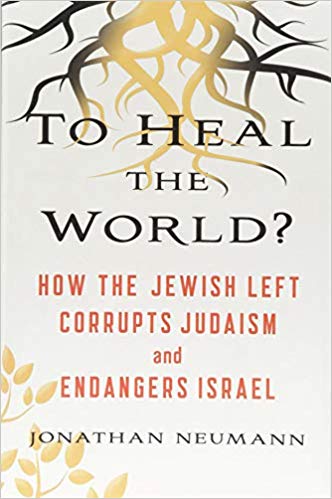Cultural Marxism. Tikkun Olam: Repair the World Misappropriated. Neumann

To Heal the World: How the Jewish Left Corrupts Judaism and Endangers Israel, by Jonathan Neumann. 2018
Tikkun Olam (Repairing the World): An Ambiguous Phrase Coopted by Jewish Leftist Politics, Old and New
This book is relevant to understanding not only Judeo-Bolshevism, but also the successor leftist ideologies, notably neo-Marxism.
THE ZYDOKOMUNA IN THE LIGHT OF TIKKUN OLAM
Neumann comments, “Jewish Renewal was hardly the first appearance of radicals in the American Jewish community—where radicalism in fact has a long pedigree. Much of the political activism in the Eastern European Jewish community in the early twentieth century took the form of socialism and communism, imported from Tsarist Russia and nearby nations…From Communists to anti-Vietnam activists and from feminists to civil rights campaigners, radical movements in America have always boasted a significant Jewish cohort.” (pp. 16-17).
JEWISH COMMUNISTS REMAIN JEWS
Much is made of the fact that Jewish Communists are usually those who have abandoned Jewish tradition. They nevertheless still remain Jews—if only in an ethnic sense. In addition, the “abandoned Judaism” notion is way overblown. Neumann sagely points out that, “Tikkun olam is not about turning Jews into Marxists. It’s about rebranding Marxism as Judaism.” (p. 30). Well said!
“SOCIAL JUSTICE”
Communism is part of something much bigger. Neumann comments, “Social justice is a political philosophy that advocates the redistribution of income—and sometimes even wealth and other property—in order to achieve economic egalitarianism.” (pp. x-xi).
CO-OPTING BIBLICAL TEACHINGS FOR LEFTIST POLITICAL PURPOSES
Author Jonathan Neumann goes into considerable detail on this subject. It is very easy to adapt a Biblical event towards some end. For instance, consider the Exodus account. He writes, “These partisans included African-American campaigners for civil rights, parliamentarians in the English Civil War, French revolutionaries, Marxists, Boers, black anti-apartheid South Africans, Latin American preachers of Liberation Theology, leaders of the German Peasants’ Revolt, Protestant Reformers, and, of course, the Founding Fathers of the United States.” (p. 88).
The author concludes, “What the Bible says and what the Jewish social justice movement thinks it says diverge. Abraham’s appeals for Sodom are not the purpose of Judaism. The story of Jewish is not a straightforward example of benevolent government. The Exodus from Egypt is not reducible to political revolution. The ‘prophetic legacy’ is not social justice. And tikkun olam itself has never meant what American Jews now understand the term to mean.” (p. 153).
AND NOW IT IS CULTURAL MARXISM
Neumann writes, “The agenda of Jewish social justice is all-encompassing, and naturally the approach is uniformly leftist. We’re talking higher taxes, increased regulation of business, big labor, expanded entitlements, condemnation of any limitation on sexual expression, reduced military spending, greater reliance on international law and multilateral organizations, drastic overhauls to our economy and living standards in the name of ecology, and so on. The tools needed to repair the world are all liberal ones. This isn’t charity—it’s leftist politics. And it’s all in the name of Judaism.” (p. xv).
THE REAL TIKKUN OLAM HAS NO RELEVANCE TO LEFTIST POLITICAL AGENDAS
The author discusses the absence of the term tikkun olam in the Bible, the ambiguous meaning of the phrase, and its Jewish-centered usage in the Talmud and Aleinu. (p. 128-135).
The connection to leftist politics is even more tenuous, if that. Neumann comments, “As we shall presently see, tikkun olam in traditional Judaism has no connection to tax rates, the labor movement, abortion, immigration reform, healthcare provision, education concerns, environmentalism, or any of the many other political issues in which social justice is interested.” (p. 120).
THE NOAHIDE LAWS DO NOT NECESSARILY MAKE JUDAISM MORE UNIVERSAL
On another subject, Neumann has this to say about the vagueness of the Noahide Laws, “The relevance of the Noahide code is, however, unclear, as there’s little consensus over the basis for these laws, their application outside of the Land of Israel or prior to the messianic age, whether Jews need actively to teach them to gentiles, whether gentiles are obligated to obey accompanying rabbinic legislation, and so on.” (p. 226).
To see a series of truncated reviews in a Category click on that Category:
- All reviews
- Anti-Christian Tendencies
- Anti-Polish Trends
- Censorship on Poles and Jews
- Communization of Poland
- Cultural Marxism
- German Guilt Dilution
- Holocaust Industry
- Interwar Polish-Jewish Relations
- Jewish Collaboration
- Jewish Economic Dominance
- Jews Antagonize Poland
- Jews Not Faultless
- Jews' Holocaust Dominates
- Jews' Holocaust Non-Special
- Nazi Crimes and Communist Crimes Were Equal
- Opinion-Forming Anti-Polonism
- Pogrom Mongering
- Poland in World War II
- Polish Jew-Rescue Ingratitude
- Polish Nationalism
- Polish Non-Complicity
- Polish-Ukrainian Relations
- Polokaust
- Premodern Poland
- Recent Polish-Jewish Relations
- The Decadent West
- The Jew as Other
- Understanding Nazi Germany
- Why Jews a "Problem"
- Zydokomuna